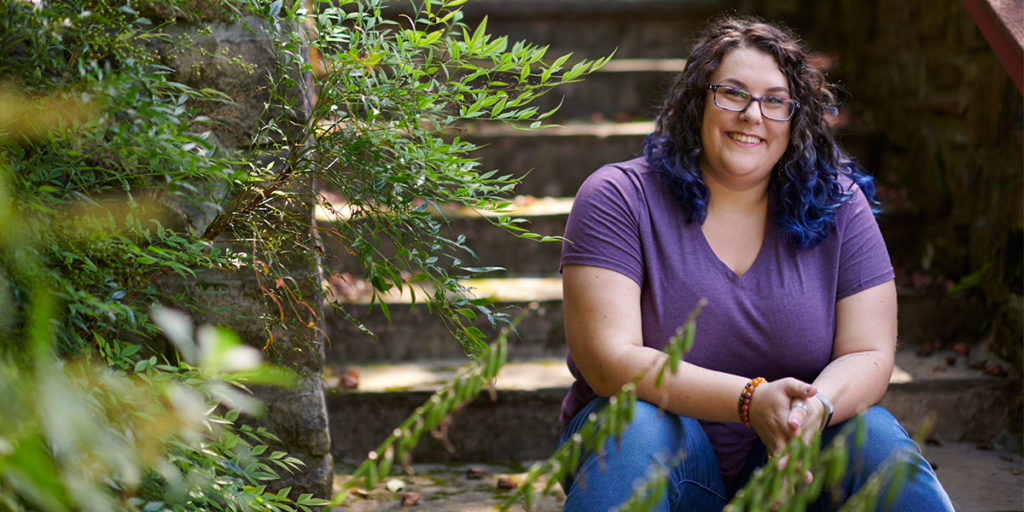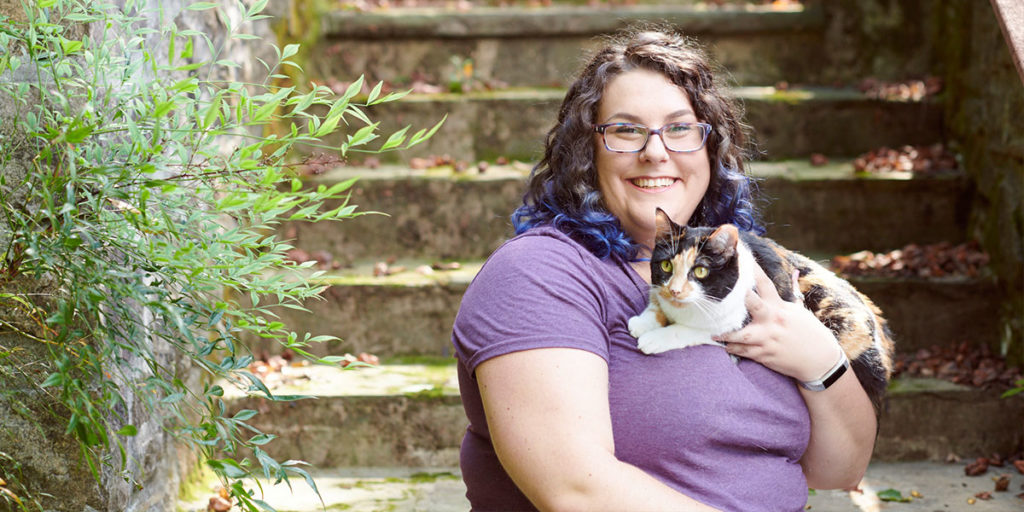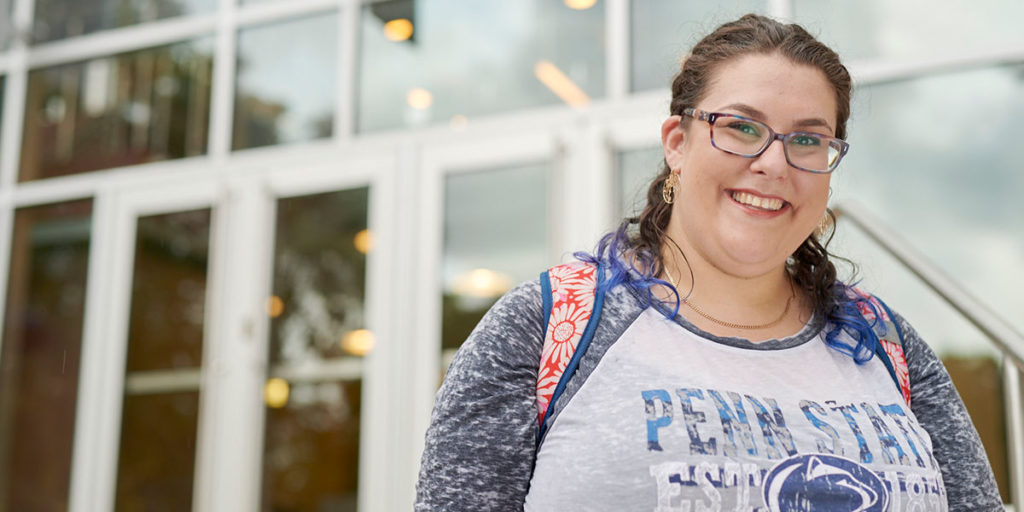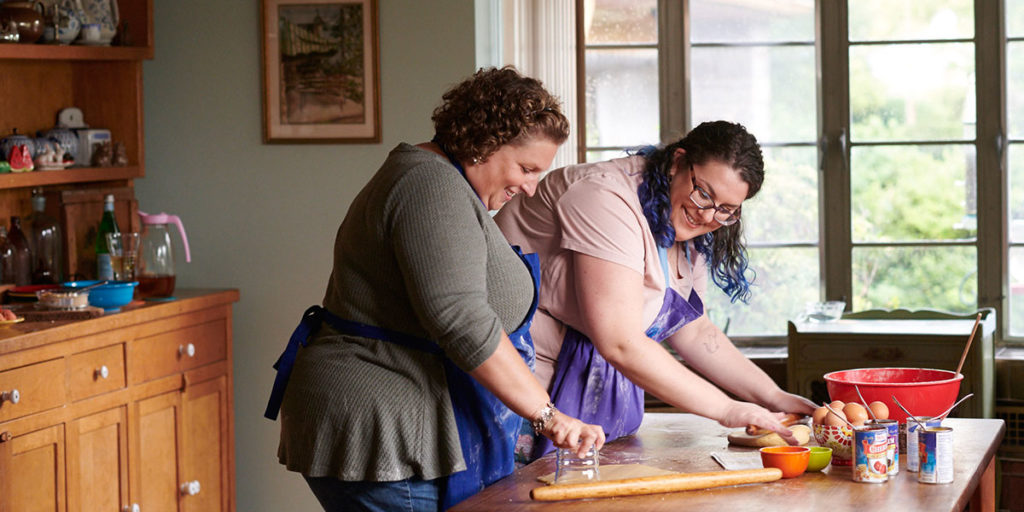Melissa
Skyland Trail provided a “bubble of healing.”
When I walked through the doors of Skyland Trail, I had been struggling with mental health challenges for eight years and had been in multiple psychiatric hospitals and day programs, a few of which were the results of serious suicide attempts. I had a chart over an inch thick from a variety of mental health professionals, starting with my initial diagnosis at age 13.
When I was 19 years old, during one of my inpatient stays, the treatment team encouraged my parents to have me apply for disability and to put me in a group home because I couldn’t be stabilized and they feared I wouldn’t have much of a future. My mother’s response was, “absolutely not.”
Fortunately, my family had been attending a weekly peer support group. My mother called one of the group leaders who told my mother her own personal story: she had gone to a residential program, which had really helped her. My mother researched and found Skyland Trail.

When I arrived, I was such a zombie! I was on four or five medications and I couldn’t focus. I had lived my life under this fog of illness, interpreting every thought/feeling/emotion as a symptom. I said, “I’m sick of being sick. This isn’t how I want to live and something’s got to change.” From day one, I put 110 percent into getting well.
Skyland Trail saw me as a person instead of a diagnosis. And they helped me see myself as a person too.
I learned that a lot of the trauma I had to heal from was from the traditional mental health system trying to help me. Previous treatment had focused on fixing what they saw as a “broken brain.” Their goal was to help me manage symptoms and be stable. But I wanted to thrive and grow! I wanted to succeed and challenge myself!
Skyland Trail taught me that mental health treatment is a whole body experience and to view my life holistically. It’s not just therapy and taking psychiatric medications to stay out of the hospital.
One of the first things my Skyland Trail psychiatrist, Dr. Kotwicki, did was a thorough check of my physical health. He discovered that I was incredibly vitamin B and vitamin D deficient, and I started receiving supplements immediately.
I was enrolled in the dialectical behavior therapy (DBT) program and learned that if I experience an emotion or a sensation in my body that I don’t like, or that makes me uncomfortable, I’m not helpless to it. DBT gave me the tools to live life in a way that makes me comfortable.
I spent almost every free minute outside of treatment hours in the art room. During my dark days, I lost my passion for creativity. Helen Goldberg and the art program helped me spark my creativity again and realize that crafting and making things can be part of me being well.
I was also part of the Healthy Challenge program, which really helped me experience the connection between what I eat, how my body feels, and how all of that affects my energy and mood.

Having a community, a group of “these are my people,” was so important! I made genuine friendships, a few of which are still important to me today.
The environment at Skyland Trail, with spaces in nature for reflection, really helped my healing journey. Spending time in the greenhouse with Libba Shortridge, the horticultural therapist, was usually a daily occurrence. My favorite spot was “the grotto,” a small pond with resident turtles and koi. I loved hanging out with those turtles, the calming feeling of the pond and nature encouraged my personal meditation practice. It was so healing for me to sit with myself and my feelings, to figure out who I was, and to accept, forgive, and love… those moments were really vital to my recovery.
Overall, Skyland Trail provided a “bubble of healing.” I forgot about the outside world for a few months, and that protective bubble allowed me to do the work I had to do to get well.
I was at Skyland Trail for four months before graduating and returning to the suburbs of Philadelphia where I grew up. Leaving Skyland I felt like I had been given a second chance at life: no more revolving hospital doors.
The transition from Skyland’s “bubble of healing” to the “real world” can be tough. I was living with my mom, who is my number one support, but the environment— the same places where I had previously isolated and attempted suicide —made me start to feel sick again. I knew I needed to get out of that physical space.
My dream job, and what I had been working towards prior to Skyland, was to work for a circus company. Coincidentally, that summer a children’s circus school was holding a one-week resident camp nearby. My younger cousin was one of the circus stars, and I attended a Circus of the Kids performance. I was so impressed! After the performance, I walked up to the director of the circus company, I shook his hand, and I said, “My name is Melissa, and I want to work for you.”
Two weeks later I was offered a job with their traveling education program, and I toured for a year living in the circus tour bus. It was incredible! I became a circus coach, among other many roles, and we went into schools and youth programs to teach kids circus arts. My therapist in Philadelphia agreed to biweekly phone sessions, I was able to call other supports on the phone regularly, and I had a three-month supply of the medications sent to me. I had a few people on tour who I shared my history and challenges with and who helped me maintain my wellness on the road. It was difficult, but it was definitely what I needed in terms of life experiences.
After a year and a few months, I started to feel the need for some stability—getting my own place and adopting a cat quickly became my next goal. I came home to Philadelphia, and I got a job as a therapeutic support staff for children with special needs in a local middle school. I also enrolled in Penn State–Abington and started taking evening classes to complete a bachelor’s degree in Rehabilitation and Human Services. I will graduate in December 2019.

I loved working at the middle school, but I knew my passion for helping others with their own mental health challenges was in my future, so I decided to become a Certified Peer Specialist (CPS). At Skyland Trail, peer specialists like Wade Lee had helped me with my recovery.
In 2016 I was one of 20 participants selected in Montgomery County, PA, to take the Certified Peer Specialist training. Since becoming a CPS I have worked my way up to the Assistant Program Director of a peer support program which includes supervising a team of mobile CPS staff. I also run support groups for those who identify with hearing voices or sensing or seeing things that others do not as a part of the Montgomery County Hearing Voices Network. I also run support groups for people struggling with thoughts or feelings of suicide.
I love running support groups because I can be part of a peer community that helps folks find their own way to recovery. Peer support asks the question, “what does your recovery look like for you?”
Since becoming a Certified Peer Specialist I’ve also advanced my education in Wellness Recovery Action Planning (WRAP) which is a program I use daily to keep my recovery balanced. I’ve also taken advanced trainings in Intentional Peer Support and am now training others within my agency.
Before Skyland Trail, I was a mental health patient. Now I’m a successful adult. And I’m helping others find their own path to wellness. Recovery is always a possibility! Finding how, and why, and when, and all the little details is an individual process, but it’s always a possibility. I think it’s important for everyone—mental health professionals especially—to know that!
Today, I am a pretty typical 27-year-old, living my life with the awareness that what I do affects my mental health. I don’t have to constantly look through the lens of a diagnosis. I just have to be a little extra aware about how things affect me positively or negatively because of a diagnosis. I don’t pet my cat or go to a concert because they are wellness tools, I do those things now because I enjoy them and they make me happy.
I’ve continued to have my creativity and love for nature as vital parts of my life. I also continue some of the practices I started in Skyland such as DBT therapy and meditation. I couldn’t bring the Skyland trail community with me, but I come back to visit when I can and I built a recovery community for myself in Philly.

Like a houseplant, I know I need enough water and sunlight to survive. I make sure that I eat right, sleep well, and hydrate. I have to get outside and spend time with family and friends. I often volunteer on the weekends helping friends with disabilities get out of the house and do things meaningful to them in the community. I also volunteer with the Jewish Relief Agency once a month packing food boxes and delivering them to food insecure families in the area.
I’m now five years in recovery. I have had no hospitalizations, and for the last two years, I’ve been managing my challenges without medications. I live on my own and I have a full time job. I’m also about to graduate from college. I’ve worked hard to build the life I want, and those things weren’t a possibility before Skyland Trail.
What a complete shock to myself, my life today! If I had a crystal ball six years ago, I wouldn’t believe its forecast for my future. Before Skyland Trail, I had hopes and dreams, but they seemed impossible. What I learned at Skyland Trail was that there are options. I can do anything. Now I can do life on my terms.
After I graduate from Penn State in December, I’m not entirely sure what my future will be. I’m potentially interested in peer advocacy at a national level or further education focused on psychology of childhood trauma. There is definitely a fire and a passion within me for recovery-oriented mental health.
I’m climbing up the stairs that can go anywhere. Who knows what’s next. But watch out world here I come.
Photo Credit: Dave Moser
